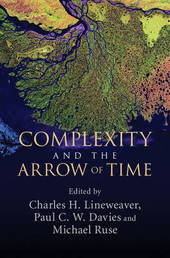
|
Complexity and the Arrow of Time
Hardback
Main Details
| Title |
Complexity and the Arrow of Time
|
| Authors and Contributors |
Edited by Charles H. Lineweaver
|
|
Edited by Paul C. W. Davies
|
|
Edited by Michael Ruse
|
| Physical Properties |
| Format:Hardback | | Pages:368 | | Dimensions(mm): Height 234,Width 158 |
|
| Category/Genre | Philosophy of science
History of science |
|---|
| ISBN/Barcode |
9781107027251
|
| Classifications | Dewey:501 |
|---|
| Audience | |
|---|
| Illustrations |
2 Halftones, unspecified; 12 Line drawings, unspecified
|
|
Publishing Details |
| Publisher |
Cambridge University Press
|
| Imprint |
Cambridge University Press
|
| Publication Date |
8 August 2013 |
| Publication Country |
United Kingdom
|
Description
There is a widespread assumption that the universe in general, and life in particular, is 'getting more complex with time'. This book brings together a wide range of experts in science, philosophy and theology and unveils their joint effort in exploring this idea. They confront essential problems behind the theory of complexity and the role of life within it: what is complexity? When does it increase, and why? Is the universe evolving towards states of ever greater complexity and diversity? If so, what is the source of this universal enrichment? This book addresses those difficult questions, and offers a unique cross-disciplinary perspective on some of the most profound issues at the heart of science and philosophy. Readers will gain insights in complexity that reach deep into key areas of physics, biology, complexity science, philosophy and religion.
Reviews'The emergence of complex systems after the Big Bang, from a Universe that started out in a very simple state, is one of the great puzzles of science. This book provides the best single-volume insight into the nature of this puzzle, and hints at its possible resolution. It may be the answer to life, the Universe, and everything.' John Gribbin, University of Sussex 'In physics, chemistry and biology, the topic of complexity is, in a word, complicated. This collection is invaluable as an introduction to the many intractable open questions this subject raises, such as how best to define complexity, and how, why and if it increases.' Jeremy Butterfield, University of Cambridge '... fascinating lines of thought ...' Daniel McShea, Science 'This work is essential reading for researchers in almost every philosophy- or theory-based field. It exposes the universe as a 'quantum computer' from which meaning can be found only through intradisciplinary and interdisciplinary thinking ... Highly recommended.' J. A. van Reenen, Choice
|